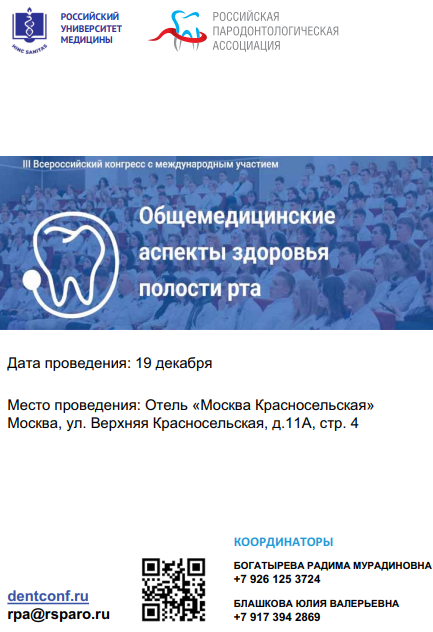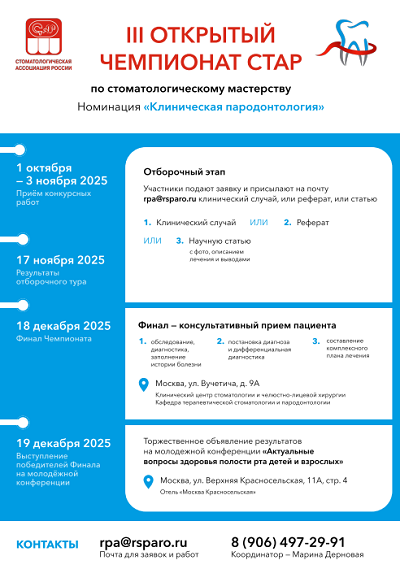Principles of orofacial cleft classification: historical perspectives and contemporary concepts
https://doi.org/10.33925/1683-3031-2025-973
Abstract
Relevance. The available literature confirms that classification of orofacial clefts remains a pressing issue: there is no universally accepted system and no common criteria for constructing one.
Objective. To review the evolution of orofacial cleft classification systems and propose an expanded framework.
Materials and methods. We reviewed Russian and international sources (1976–2023), retrieved via extended search capabilities across multiple bibliographic databases.
Results. The article describes the principles and approaches used to construct classifications of orofacial clefts, tracing their historical development and current concepts.
Conclusion. Classifications based on anatomical, morphological, clinical, and embryologic principles have largely been exhausted. Accordingly, etiopathogenesis-based classifications should serve as the most effective tool for understanding, prevention, and treatment of this congenital craniofacial anomaly. The authors present an etiopathogenetic classification of orofacial clefts.
Keywords
About the Authors
I. V. MouratovRussian Federation
Igor V. Mouratov, DDS, Assistant Professor, Department of the Maxillofacial and Oral Surgery; Senior Lecturer, Department of the Oral and Maxillofacial Surgery; Doctor of Maxillofacial Surgery, Maxillofacial Surgeon
Saint Petersburg
L. N. Soldatova
Russian Federation
Lyudmila N. Soldatova, DMD, PhD, DSc, Professor, Department of the Pediatric Dentistry and Orthodontics; Senior Lecturer, Department of the Oral and Maxillofacial Surgery
L. Tolstoy St., 6-8, Saint Petersburg, Russian Federation 197022
S. A. Kobzeva
Russian Federation
Svetlana A. Kobzeva, DMD, PhD, Associate Professor, Department of the Prosthodontics; Chief Medical Officer
Saint Petersburg
References
1. Arutyunov S.D., Yuzhakov A.A., Kharakh Y.N., Bezukladnikov I.I., Astashina N.B., Baidarov A.A. Interactive digital platform and cyber-physical systems in medical education. Parodontologiya. 2022;27(4):318-326 (In Russ.). https://doi.org/10.33925/1683-3759-2022-27-4-318-326
2. Kozlov V.A., Mouratov I.V., Kozlov G.A., Semenov M.G., Mushkovskaya S.S. Classification of congenital palatal clefts and defects after uranoplasty. 2000;79(1):58-61. Режим доступа: https://elibrary.ru/item.asp?id=38209723
3. Kuznetsov N.A. Classifications in medicine: principles of their structure and clinical significance. 2017;95(5):474-480. https://doi.org/10.18821/0023-2149-2017-95-5-474-480
4. Mamedov Ad. A. Treatment of children with congenital cleft lip and palate in modern conditions of development of public health services in Russia. Vestnik Rossijskoj akademii estestvennyh nauk. 2007;7(4):69-74 (In Russ.). Available from: https://elibrary.ru/item.asp?id=9919643
5. Mouratov I.V. On the question of the terminology of orofacial clefts. Medicina i obrazovanie. 2022;(1):33- 35 (In Russ.). Available from: https://www.elibrary.ru/item.asp?id=50456448
6. Rogozhina YuS., Blokhina SI, Bimbas ES. Issue of detailing the classifications of congenital cleft upper lip and palate. Actual problems in dentistry. 2019;15(4):162-169. https://doi.org/10.18481/2077-7566-2019-15-4-162-169
7. Allori AC, Cragan JD, Della Porta GC, Mulliken JB, Meara JG, Bruun R, et al. Clinician's Primer to ICD-10- CM Coding for Cleft Lip/Palate Care. Cleft Palate Craniofac J. 2017;54(1):e7-e13. https://doi.org/10.1597/15-219
8. Allori AC, Mulliken JB, Meara JG, Shusterman S, Marcus JR. Classification of Cleft Lip/Palate: Then and Now. Cleft Palate Craniofac J. 2017;54(2):175-188. https://doi.org/10.1597/14-080
9. Cheng LR. Asian-American cultural perspectives on birth defects: focus on cleft palate. Cleft Palate J. 1990;27(3):294-300. https://doi.org/10.1597/1545-1569(1990)027%3C0294:aacpob%3E2.3.co;2
10. Elsherbiny A., Mazeed A.S Comprehensive and reliable classification system for primary diagnosis of cleft lip and palate. Journal of Cranio-Maxillofacial Surgery. 45(6):1010-1017. https://doi.org/10.1016/j.jcms.2017.03.008
11. Fearon JA. Rare craniofacial clefts: a surgical classification. J Craniofac Surg. 2008;19(1):110-120. https://doi.org/10.1097/scs.0b013e31815ca1ba
12. Flierman S, Tijsterman M, Rousian M, de Bakker BS. Discrepancies in Embryonic Staging: Towards a Gold Standard. Life (Basel). 2023;13(5):1084. https://doi.org/10.3390/life13051084
13. Harkins CS, Berlin A, Harding RL, Longacre JJ, Snodgrasse RM. A classification of cleft lip and cleft palate. Plast Reconstr Surg Transplant Bull. 1962;29:31-39. https://doi.org/10.1097/00006534-196201000-00005
14. Hill MA. Early human development. Clin Obstet Gynecol. 2007;50(1):2-9. https://doi.org/10.1097/grf.0b013e31802f119d
15. Houkes R, Smit J, Mossey P, Don Griot P, Persson M, Neville A, et al. Classification Systems of Cleft Lip, Alveolus and Palate: Results of an International Survey. Cleft Palate Craniofac J. 2023;60(2):189-196. https://doi.org/10.1177/10556656211057368
16. Kaufman MG, Cassady CI, Hyman CH, Lee W, Watcha MF, Hippard HK, et al. Prenatal Identification of Pierre Robin Sequence: A Review of the Literature and Look towards the Future. Fetal Diagn Ther. 2016;39(2):81-89. https://doi.org/10.1159/000380948
17. Kernahan DA, Stark RB. A new classification for cleft lip and cleft palate. Plast Reconstr Surg Transplant Bull. 1958; 22(5):435–441. https://doi.org/10.1097/00006534-195811000-00001
18. Kriens O. “What Is a Cleft Lip and Palate?: A Multidisciplinary Update: Proceedings of an Advanced Workshop, Bremen 1987.” Stuttgart; New York: Thieme, 1989.161 pp. Available from: https://catalog.nlm.nih.gov/discovery/fulldisplay?docid=alma996859063406676&context=L&vid=01NLM_INST:01NLM_INST&lang=en&search_scope=MyInstitution&adaptor=Local%20Search%20Engine&tab=LibraryCatalog&query=lds04,exact,9012751
19. Millard DR Jr. Introduction, clefts 1993. Past, present, and future. Clin Plast Surg. 1993;20(4):597-598. Available from: https://pubmed.ncbi.nlm.nih.gov/8275625/
20. Sadler T. W. Langman’s Medical Embryology. Fourteenth edition. Philadelphia: Wolters Kluwer, 2019.432 pp. Available from: https://catalog.nlm.nih.gov/discovery/fulldisplay?docid=alma9917293583406676&context=L&vid=01NLM_INST:01NLM_INST&lang=en&search_scope=MyInstitution&adaptor=Local%20Search%20Engine&tab=LibraryCatalog&query=lds04,exact,101562744&sortby=date_d&facet=frbrgroupid,include,906112-7647009887191&offset=0
21. Singh D, Bastian TS, Kudva S, Singh MK, Sharma P. Classification Systems for Orofacial Clefts. Oral Maxillofac Pathol J. 2015;6(1):556-560. https://doi.org/10.5005/jp-journals-10037-1035
Review
For citations:
Mouratov I.V., Soldatova L.N., Kobzeva S.A. Principles of orofacial cleft classification: historical perspectives and contemporary concepts. Pediatric dentistry and dental prophylaxis. 2025;25(3):305-314. (In Russ.) https://doi.org/10.33925/1683-3031-2025-973





































